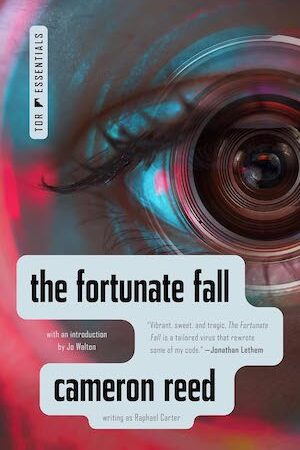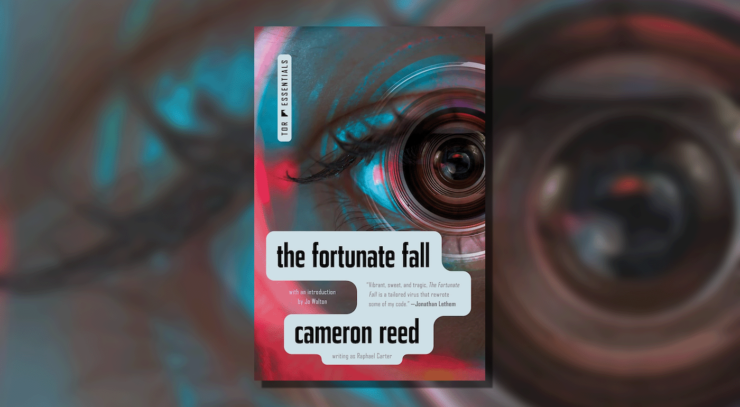We’ve been longtime fans of Cameron Reed’s iconic 1996 science fiction novel The Fortunate Fall, a story about AI, surveillance, and queerness. In 2010, Jo Walton called it “one of the most important books of the last twenty years”, and in 2018, Bogi Takács praised the novel for being “strikingly imaginative”.
After a long hiatus from publishing, Reed has returned with a new novelette, “The Girl That My Mother Is Leaving Me For”. We were thrilled to sit down with her for a short interview about her work, and a peek at what’s coming in the future.
“The Girl That My Mother Is Leaving Me For” is the first story you’ve published since 1998. What do you hope readers take away from it?
When I wrote the story I wasn’t thinking at all about conveying a message, or what readers should take away. Of course, things I believe come through in it. For instance, that trans bodies are worth cherishing. Also, that trans women can be disaster lesbians too. That’s an important fact that everyone should know.
The setting presents a dystopia where gender, desire, and domestic life are only valued as contributions to corporate goals. Could you talk more about that?
They already are only valued as that, by corporations. This is just a future in which corporations have even more power. The characters in the story have signed up to have their lives, their reproductive capacities, and their ability to form romantic and familial bonds controlled and exploited by a corporation, because their world hasn’t given them any better options. But even in the shell of a life they’ve been offered, they’re able to make their own meaning.
With the re-release of The Fortunate Fall, one of the terms that’s been used is “prescient,” especially in its handling of the internet, privacy, and online dating. How do you engage with the future as a setting?
If there’s a continuum between writers who have a well-defined, methodical approach and those who just muddle along on intuition, I am way over on the intuitive side—I don’t know how I do things. So I had to think quite a bit to come up with a better answer than “I have no idea.” I guess I’d say I’m always looking for the emotion. How does the future make people feel, how does it bring them closer or pull them apart?
In the case of online dating, it was very easy to find the feeling: I met my partner over a computer network, and we knew each other online for years before we technically met. It worked out pretty well in real life. On the day “The Girl That My Mother Is Leaving Me For” comes out, we’ll be celebrating our 30th anniversary. We were communicating over a text-only medium—that first long-distance call was momentous, and expensive—whereas the characters in the book have lots of options for making distance feel like presence, far beyond anything we have now. But really I was writing about what it was like to feel incredibly close to someone you’ve never been in the same room with. I think when people call it prescient what they must mean is that the feelings still make sense, the metaphors still resonate. Because I don’t think I predicted any specific technologies that exist.
It’s been nearly thirty years since your last published SF, and the world has changed a lot—new books, new technologies, etc. Has your approach to science fiction changed because of that?
If I think about how I’ve changed as a writer, it has very little to do with new technologies or literary influences. It’s more about my life experience and the way I see the world. When I reread The Fortunate Fall to see if I wanted to make any changes for the new edition, all I could think was, “oh God, I was so young when I wrote this book.” I could never be that brash again. And for the most part I chose to defer to the person I was then, and not override their artistic judgment, even in spots where I no longer agree with it.
Since the inauguration, every single day I’ve woken up and read about new ways that powerful people are trying to ruin my life. I always thought it was possible the US could go very wrong—that’s part of the backstory of The Fortunate Fall—but it’s one thing to believe wolves exist, quite another to see the pack turn and start running in your direction. The world does not feel like it did just a few months ago, and it’s hard to reconcile the speed of that change with the glacial pace of writing and publishing novels. At the moment I’m finishing up some revisions on my second novel, which I just finished last October, and already there’s a distance between that book and me. It expresses a particular kind of hope that I find it very hard to feel now, but that I do want to preserve. So again I’m in the position of trying to honor the intent of a person I don’t know how to be anymore.
Very soon I’ll go back to working on my third novel, which is about a group of queer people who’ve fled hostile jurisdictions and are travelling the galaxy, trying to make enough money to settle somewhere better. Unfortunately I think that one will still feel right to me for a long time.
In a story that places so much emphasis on identity, our narrator is nameless. In lieu of a name, how would she want to be remembered?
I just call her the narrator. I think she’s only beginning to figure out who she is, and there’ll be a new name in her future. For the sake of avoiding spoilers, I won’t say any more.
What are you working on now?
The book I’m revising is called What We Are Seeking, and will be published by Tor in early 2026 (Lord willing, and the censorship don’t rise). It’s about a man from a world that doesn’t practice marriage—everyone except him thinks he’s from a matriarchy. He unwisely accepts an offer to go to space, and winds up stranded on a newly colonized planet. It’s got weird biology and alien languages and a surprising amount of cooking, but mainly it’s about how to make a life when you’re forced to live among people with radically different customs—whether they’re human, alien, or AI.
Buy the Book


The Fortunate Fall










